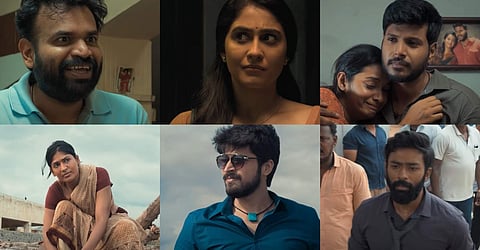Kasada Tabara: The ideas are complex, the writing sadly isn’t
Rating:(2.5 / 5)
It’s probably because anthologies are already starting to feel rather run-of-the-mill that some advertisements of Chimbu Deven’s Kasada Tabara, sought to distance the film from that label. And yet, this film, the director’s first in half a decade, IS an anthology (even if they prefer to call it a hyperlink movie)—what with separate titles and themes for each section—but with a twist. The six stories in this film occur in the same world, and the protagonists in one often turn out to be peripheral characters in the other, but with the power to very much alter events in them. The film introduces this idea to us by dropping fancy terminology like ‘vantage point theory’ and ‘Butterfly Effect’, but really, the idea that a small cause can sometimes create a profound effect, is quite easily understood, and if you have been paying careful attention to life, sometimes observed too. In a society as populated and as complex as ours though, the effects can often occur in spaces and among people we are not part of, and that’s why Chimbu Deven, in a sense, plays God. He holds the vantage point and shows us the interplay between cause and effect that the characters themselves are not privy to. In the first film, for instance, Bala (Premgi Amaren), performs a small act of kindness, which unbeknownst to him, snowballs into a profound outcome at the end. However, the question is, is this journey moving to watch—or at the very least engaging?
Director: Chimbu Deven
Casting: Sundeep Kishan, Harish Kalyan, Shanthanu Bhagyaraj, Priya Bhavani Shankar, Regina Cassandra, Premgi Amaren, Venkat Prabhu, Vijayalakshmi
I felt kindest towards the last segment, Akkarai, that features Venkat Prabhu in the lead, and that’s because it is not in a hurry to get places. It’s interested in capturing the complexity of certain moments, and more importantly, shows the patience needed to draw and focus on the emotional responses of characters. It helps that Venkat Prabhu brings in much vulnerability to his portrayal of a man who is on death row. It’s likeable that this story doesn’t try to cram in a lot, a problem that almost all the other films are guilty of.
It isn’t so much about how much is being said as it is about how it’s being said. For instance, the first film, Kavasam, tracks how Trisha (Regina Cassandra)—who looks fully decorated even after a whole night’s sleep in this film—falls in love with Bala (a likeable Premgi Amaren). It’s a chance encounter after another, and soon, she’s apparently smitten. You are told that the character is now in love, but you don’t buy it. In a scene at the beginning, Bala warns her about the water-filter dispensing burning hot water, and as he walks away, she turns at him with a glance of such yearning that makes you wonder if nobody had given her a word of well-meaning warning ever in her life. She seems already into him—and because he warned her against potentially scalding her lips?
The next film, Sadhiyaadal, speaks of problems in a love marriage, but more importantly, about power hunger. There’s something about a ‘dada’ (Sampath) and his son (Shanthanu). It's a film that tries to Machiavellian but fails to communicate any real sense of depth, its individual moments feeling simple and yet, manufactured. The gimmicky twist at the end does not help matters either.
Like in the second, the third film, Thappaattam, too, has some deep ideas. It tries to speak of caste oppression, argue against extra-judicial killings, but the writing does not seem to grasp or communicate the complexity or importance of these topics. The film is the equivalent of Kanmani (Priya Bhavani Shankar), who accuses her husband of murder, but lacks the understanding/depth to engage in conversation about it with him. The background music, like in a few other segments, overpowers dialogues to the point that sometimes you can barely comprehend what’s being spoken, but in a film that fails to create any real emotional investment, I did not really mind this.
The fourth segment, Pandhayam, is perhaps among the more interesting stories in this film. It’s about Kish (Harish Kalyan), an opportunist and a crook who won’t be stopped from making a fortune. The idea, as you have probably already guessed it by now, is interesting, but what about the details? Kish says he will turn 1 crore to 100 crore, and you are fascinated, but then, it’s all too easy. This film and its many segments often expect you to nod along and simply take it on its word. Bala and Trisha are now in love (first segment), it says, and you are not supposed to say, “Uh, but I don't buy it!” In this Harish Kalyan film too, there is one unconvincing twist after another, as it hurtles towards an end that you see coming from a mile away.
The fifth segment, Arampattra, is a sob story about pharma corruption, and what can I say about it, except that for the most part, it feels like a government-sponsored advertisement meant to educate you about the dangers of private healthcare. Perhaps that’s why a character looks at Sundari (Vijayalakshmi) and says, “Yen serial madhri azhara…” It all feels very much like one. It's really the final film, Akkarai, that I was invested in. The topic of a prisoner on death row isn’t an idea that we have explored a lot of, and Venkat Prabhu’s performance brings a lot to the table.
If I remembered this Chimbu Deven film at all, it will be for some interesting casting choices: Harish Kalyan playing a negative character, Premgi Amaren straying away from humour, Venkat Prabhu playing a wronged prisoner… But what does it say about a package of six short films that I will best remember it for some interesting casting?

